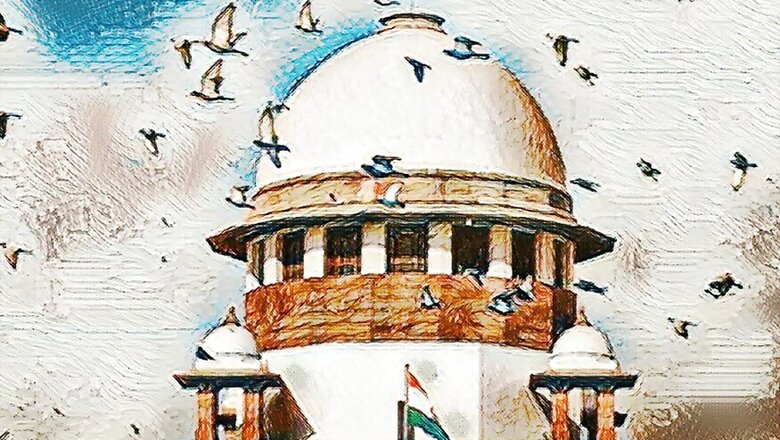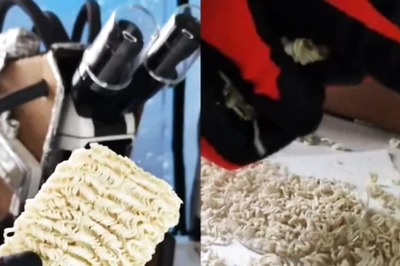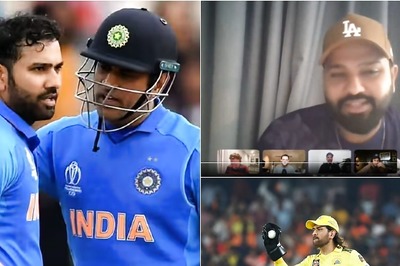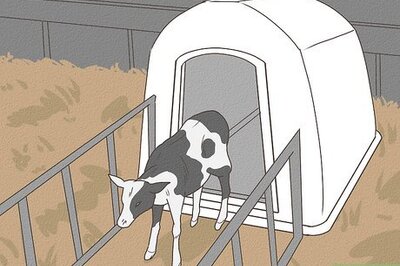
views
New Delhi: The Supreme Court sent a man to the gallows on Thursday for "horribly" gang-raping a 10-year-old girl along with a co-accused and killing her and her seven-year-old brother by throwing them in a canal with their hands tied.
Terming the offence, in Coimbatore in 2010, as "shocking" and "cold-blooded", a three-judge bench headed by Justice R F Nariman, by a majority of 2:1, upheld the verdicts of the trial court and the Madras High Court to award death penalty to condemned convict Manoharan, saying that the offence fell under the "rarest of rare" category.
The top court took note of the "significant amendment" made to the Protection of Children from Sexual Offences (POCSO) Act, 2012" by Parliament on July 24 and said that the legislature has made the provision of the death penalty in a rape case involving minor victim up to the age of 12 years.
Justices Nariman, Surya Kant and Sanjiv Khanna were on the same page in upholding the conviction of the accused of the offence of kidnapping, gang rape and murder.
However, Justice Khanna was of the view that instead of death penalty, the jail term for the remainder of the life without any benefit of remission would meet the ends of justice.
Manoharan and co-accused Mohanakrishnan, who was later shot dead in an encounter, had picked up the girl and her seven-year-old brother from outside a temple on October 29, 2010, when they were going to school.
They tied the hands of both minor siblings and brutally gang-raped the girl before trying to kill them by poisoning.
As they did not die of poisoning, the accused tied their hands and threw them to Parambikulam-Axhiyar Project canal where they drowned.
Justice Nariman, writing the judgement for himself and justice Surya Kant, said: "We have no doubt that the trial court and High Court have correctly applied and balanced aggravating
circumstances with mitigating circumstances to find that the crime committed was cold-blooded and involves the rape of a minor girl and murder of two children in the most heinous fashion
possible."
The bench took note of the intent of the legislature in amending the POCSO Act recently and said, "there can be no doubt that today's judgment is in keeping with the legislature's realisation
that such crimes are on the rise and must be dealt with severely".
It also referred to the changes made by the government in the POCSO Act which provides for the death penalty as one of the punishments in child sexual assaults cases.
"Whoever commits aggravated penetrative sexual assault shall be punished with rigorous imprisonment for a term which shall not be less than twenty years, but which may extend to imprisonment
for life, which shall mean imprisonment for the remainder of the natural life of that person, and shall also be liable to fine, or with death," reads the amended section 6 of the POCSO Act.
The minimum sentence in the amended law has gone up from 10 years to 20 years, and imprisonment for life has now been expressly stated to be imprisonment for the remainder of the natural life
of the person.
"What is more significant is that the death penalty has also been introduced," the bench noted.
"In the facts of the present case, there is no doubt that aggravated penetrative sexual assault was committed on the 10-year-old girl by more than one person. The 10-year-old girl child (who
was below 12 years of age) would fall within...the POCSO Act," it said.
The bench confirmed the death penalty of the convict and said that it was quite unlikely that the convict would not commit such crimes in future.
"No remorse has been shown by the Appellant at all and given the nature of the crime...it is unlikely that the Appellant if set free, would not be capable of committing such a crime yet again," it said.
The bench said that the convict did stand by his confessional statement in the case and falsely "retracted only those parts of the statement which implicated him of both the rape of the young
girl and the murder of both her and her little brother".
Justice Khanna, in his separate 40-page judgement, "entirely" agreed to the findings of the two judges, but differed on the award of the death penalty to the convict.
"There is so much in the comprehensive judgment of my esteemed brother Justice R F Nariman, with which I entirely agree. I would uphold the appellant's conviction...," he said.
Differing on the sentencing part, he said this was not the case where the convict should be given the death penalty.
"...would commute it to imprisonment for life that is till his natural life with a stipulation that the appellant would not be entitled to remission under...the Code of Criminal Procedure,"
Justice Khanna said.
He said that keeping the facts of the case, one has to agree that the offence was "brutal, ruthless and cruel" as two innocent children lost their lives.
"There is substantial medical and other evidence to show that the young girl was mercilessly sexually abused and raped by the appellant and Mohanakrishnan (since deceased).
"Thereafter the children were administered poison and thrown into a canal to die. The pain and trauma suffered by the small children who were not at fault and the agony of the parents and grandmother are immense, incalculable and would remain forever. The punishment must be severe," Justice Khanna said.
However, he said that by balancing the aggravating circumstances with the mitigating ones, the case did not fall under the "rarest of rare" category warranting award of the death penalty.




















Comments
0 comment